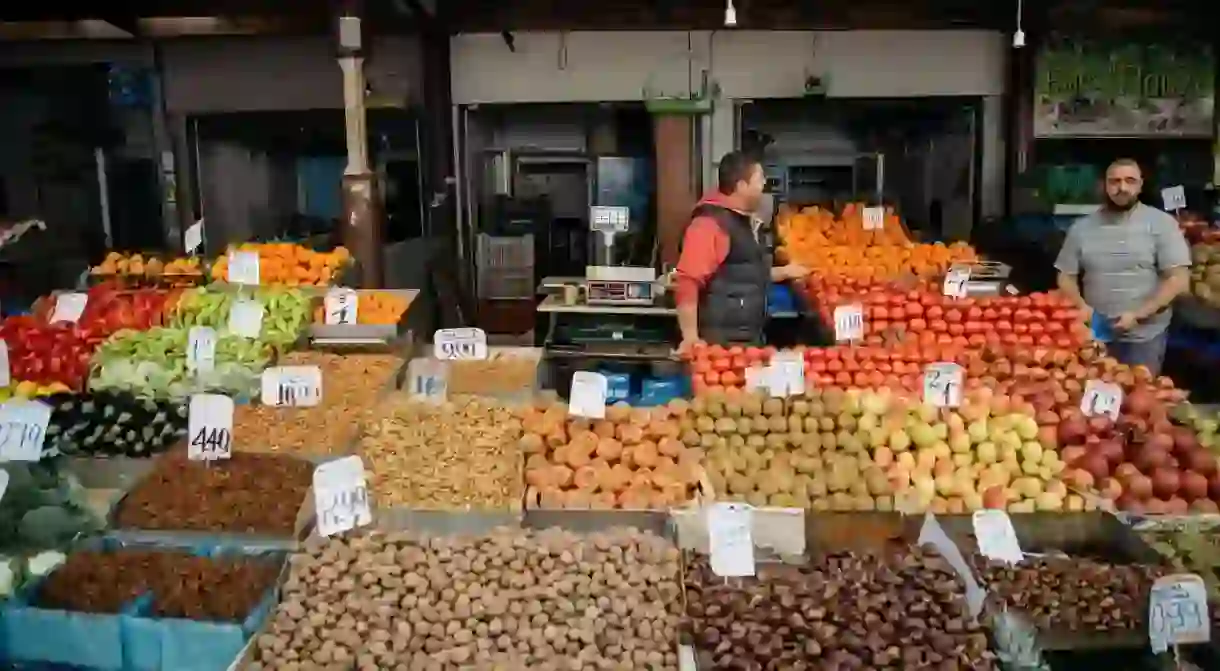Why You Need to Visit Athen’s Farmers Markets

The bustle and energy of Athens are best experienced at the city’s many farmers markets. On any given day, bright orange umbrellas will spring up on a central street in one of Athens’ neighbourhoods, announcing the arrival of one of the foodie highlights of the week.
Step into these markets, and the noise, crowds, smells and array of produce is wholly absorbing. For a sense of authentic Athens, you won’t find a better experience than this.
Greek markets have been around since ancient times when locals used to gather at central areas in the city to trade with merchants from the Middle East and Europe. The role of the ‘Agora’ was central to Greek public life, serving as a locus of political and cultural exchange, as well as where you could buy produce.

Today, the mechanisms of society may have decentralised and expanded, but the importance of the market, and especially the role that fruit and vegetable markets – ‘the Laiki’ – play within everyday Athenian life, is palpable.
Throughout the year, the produce varies. In an age of ubiquity, where a trip to the supermarket will see you encounter the same food all year round, a visit to the Laiki proves both entertaining and educational.
In the winter, shoppers will encounter any number of root vegetables and leafy greens. This season is the time to buy oranges too, which frequently tumble off of stalls due to their abundance. They’re large and sweet, unlike the oranges on the trees around Athens at this time of year, which are bitter.
As spring approaches, there is a noticeable and sudden change in the colour of the market, thanks to the influx of delicious fruit. Expect to find rich, ripe cherries and juicy apricots, as well as courgettes with their flowers still attached. The latter is great to buy if you’re looking to try your hand at stuffed courgette flowers, one of the most delicious traditional Greek dishes.
During the summer months, you’ll find a larger selection of honey infused with herbs and litres of local wine on sale for a few euros. There’s also plenty of peaches, nectarines, berries and huge watermelons to fill your kitchen.

One of the modern highlights of the ‘Laiki’ experience is the kalamaki stands, which pop up next to the stalls of fruit and vegetables. These are traditional skewers of pork or chicken, cooked on an open grill with lots of herbs and oil. Unlike the souvlaki which offers a full and hearty meal, the kalamaki is a lighter alternative that can be enjoyed at any time of day.
The selection of produce on offer at these farmers markets is not only better than at the supermarkets, but it’s also cheaper. Being a part of the market culture fuels the local economy, supports local businesses and helps if you’re living on a budget.
Shopping at these markets also offers a more sustainable alternative than heading to the larger stores. Once you have dug into a pile of hundreds of tomatoes and discovered the joy of buying citrus fruits by the kilo, the idea of purchasing a plastic covered box of two pieces of fruit seems highly unappealing – and environmentally unfriendly.
Local farmers set up their stalls early in the morning, and customers come throughout the day. Things begin to unwind late into the afternoon, though the savvy market-goer knows that this is also when you’re likely to get the best prices for your fruit and vegetables.
The markets take place in central Athens and the suburbs throughout the week, so there’s always an opportunity to visit. Just make sure to bring enough bags and helping hands to ensure you can carry all of your delicious purchases home.













